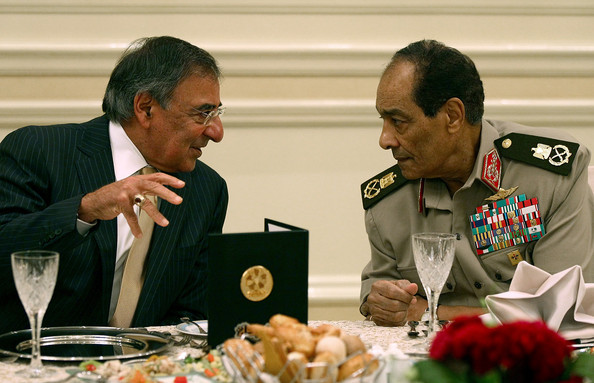U.S. democracy-building organizations — one Republican, one Democrat, both funded by the U.S. taxpayer — that have been telling Egyptians how to be good democrats, how to demonstrate peacefully and have truly free elections didn’t sit too well with the Egyptian military, which has ruled Egypt since 1952.
The only real democracy Egyptians have known in five millennia was between 1946, the end of the British mandate, and 1952, when Col. Gamal Abdel Nasser and his “Free Officers” seized power and overthrew the monarchy.
Egypt’s military held power for the next 60 years (18 years under Nasser, 12 with Anwar Sadat and 30 with Hosni Mubarak). U.S. political organizations figured they could teach the Egyptians a thing or two about democratic systems of governance.
Along with 15 other human rights and pro-democracy groups shuttered, the military seized computers and records and sealed their offices. But the damage, as the military assessed it, had already been done.
Before the revolution marks its first birthday Jan. 25, 41 percent of the Egyptian votes counted went to the Muslim Brotherhood and 26 percent to Muslim extremists known as Salafists, a jihadist movement that believes in “Holy War” against the “crusaders,” i.e., Christians and Jews.
What these two branches of Islam have in common is their idea of “free” elections — one-man-one-vote-one-time. After their expected victory, Egyptians can forget about another free election as far as anyone can peer into the future.
This is what happened in Algeria in 1990 when Islamists won the first free elections in the young (1962) nation’s history, which triggered a civil war and some 20,000 killed before Abdelaziz Bouteflika, now 75, returned to power with army support.
Mubarak, the former president now on trial for corruption, once said, “It’s either me or the Muslim Brotherhood.” America’s democratic do-gooders had a different take on the state of Egyptian opinion. They convinced themselves that Egypt was ripe for Western-style democratic politics.
The two U.S. political organizations — the National Democratic Institute and the International Republican Institute — are accused of interfering in Egyptian politics. They were spending a little less than $10 million a year each on promoting democracy.
But how would the United States react if two Egyptian political organizations were advising our own Republicans and Democrats how to conduct fairer elections? Or how to cope with the sham of the bipartisan supercommittee on budgetary reductions that wound up being described as two drunks arguing over the bar check on the Titanic.
In a single year, U.S. Department of Homeland Security officials spent the equivalent of 66 work years responding to congressional requests. From 86 congressional committees, subcommittees and caucuses that the Homeland Security Department first reported to, it now has to answer to 108. It also provided more than 5,000 briefings and appeared at 370 hearings in a single year.
The way Homeland Security figures it, that’s the equivalent of 66 work years responding to congressional requests. The department also employs dozens of civil servants whose only job is to prep witnesses.
Egyptians invented bureaucracy 5,000 years ago and local media took delight in pointing out that the United States now holds a world record in red tape.
The Republican and Democrat organizations operating in Egypt confined most of their activities to major cities — Cairo and Alexandria — instead of working the boonies of the Nile River Delta where Muslim parties had been active for years — and where they won big.
But the action on Tahrir Square in the heart of Cairo once again captured world attention. There almost 50 were killed and 3,000 injured in the renewal of demonstrations demanding that the army speed up its withdrawal from politics.
The Supreme Council of the Armed Forces was in no hurry to give up its commanding position and the roughly one-third of the Egyptian economy that it owns.
Winners in a tacit coalition could be orthodox Muslims with army support backstage. The Obama administration, bowing to the inevitable, has decided to try to work with this new anti-U.S. Egyptian power.
That the new Egypt will be less compliant to U.S. wishes is a given. This, in turn, will mean the U.S. Congress will be less likely to renew U.S. military aid to Egypt, now running at $1.3 billion a year.
Egypt’s peace treaty with Israel won’t be scrapped but it will be buffeted by strong hostile winds.
Egypt will move closer to Iran, not a good omen for the United States. This also implies a closer relationship with Iran’s friends in the region — Hezbollah in Lebanon, Hamas in Gaza and the Assad regime in Syria (if it survives the 5,000 plus anti-regime demonstrators it has killed so far).
After the army prevailed in Tahrir Square, SCAF, sensing an opportunity in regional politics, sent a bevy of generals winging to Tehran. Iran has also moved warships through the Suez Canal without a hint of opposition — and dispatched an ambassador to Cairo for the first time since relations were severed in 1979.
Arnaud de Borchgrave, a member of the Atlantic Council, is editor-at-large at UPI and the Washington Times. This column was syndicated by UPI.
